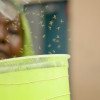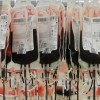Nell - So, this first story is a really interesting one. It's called The Cancer Genome Atlas. The main part of it is the Pan-Cancer Initiative. It's all sounding very exciting already. Basically, what this is all about is probing the genetic faults of the heart of several different types of cancer. You might have noticed that The Cancer Genome Atlas - TCGA.
Kat - It's the letters of the DNA!
Nell - I didn't even notice because it was so nerdy, but now that I have, I'm really enjoying it a lot. The idea is that they're looking at all the different types of genetic mutations you get across many different types of cancer. We're finding patterns, so this is really a part of this move away from classifying a cancer based on where it starts in the body, moving to understanding exactly what mutations it has and starting to treat the cancer based on that, not based on where it started.
Kat - They've just published this first group of papers. That's about 18 papers published in Nature Genetics and other journals, really getting to grips with some of these massive, massive data sets to look for patterns. What kind of things have they found?
Nell - So, it's really interesting because I suppose the first thing which we sort of suspected would be the case, and it's certainly been coming out in more and more studies, is that different types of cancers, say, breast cancers and bowel cancers may sometimes actually have the same mutations. This is great in one sense because it means that you could maybe be re-using drugs that have only been used for one type of cancer, and starting to use them for another type of cancer. So, that's great in terms of speeding up development of new treatments. But the other thing that's come out of this which is kind of a bit more broad is that you can actually divide mutated cancers into these two groups. So, there's one type where the chromosomes are just completely messed up and in the other group, it tends to be all these small point mutations that are messing with specific genes. So, we're see some of pattern there, in how these mutations were actually occurring in the cancer cells.
Kat - They are really interesting results when you get to grips with them and fascinating things like, they found that some head and neck cancers were similar to about 10 per cent of bladder cancers. They share the same gene faults and that means you could potentially use the same treatments across those different types of cancer. There are big implications for treatment and also for clinical trials, I think.
Nell - Yeah, absolutely. So, instead of saying, "Okay, you've got bladder cancer. You're going to go on a bladder cancer trial", you would look straight away at the mutation and you can then really just build the trials around the types of mutations that you're trying to target rather than where the cancer started. And this could be really, really helpful because it might mean that you can pull out those small groups of patients who maybe don't benefit from current drugs and find something that is going to work for them and really start to pull out all that data from this interesting knowledge that we've got.
Kat - And I think there's another group that could benefit and that's patients who have a cancer called CUP or Cancer of Unknown Primary. How could they benefit?
Nell - Yeah, I think that would be really interesting for this because this is actually surprisingly common that somebody will be diagnosed with a cancer that's already spread, but the doctors can't find where it started. At the moment, this is a real problem because it means we can't decide how to treat those cancers. If instead, you can just go straight to picking out these individual mutations and saying, "Right. Well this drug is definitely going to work. This one definitely isn't." It could mean that it may no longer be so much of a problem that you can't identify the place where the cancer began. So, that could be really helpful. CUP is actually about 9,000 cases a year in the UK, so it's not an insignificant number.
Kat - I think it's going to be a very exciting couple of years ahead of us.
- Previous Sister stem cell clues
- Next Prof Hugh Watkins - Sudden heart death










Comments
Add a comment